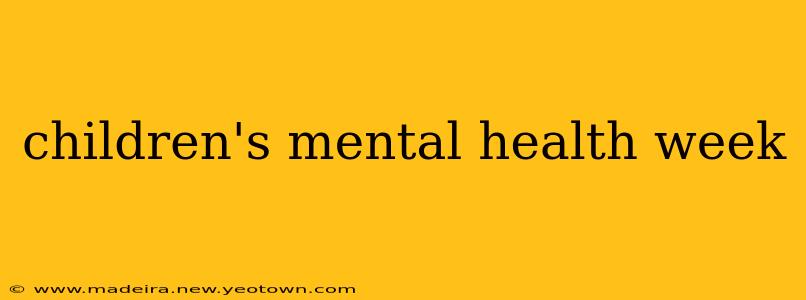Children's Mental Health Week is an annual event dedicated to raising awareness, understanding, and support for children's emotional well-being. It's a time to shine a light on the vital importance of nurturing young minds and creating a supportive environment where children can thrive. This isn't just about identifying problems; it's about celebrating the resilience and potential within every child and fostering positive mental health from the start. This year, more than ever, the focus is on creating a brighter, healthier future for our youngest generation.
What is Children's Mental Health Week?
Children's Mental Health Week is a powerful initiative orchestrated by Place2Be, a children's mental health charity in the UK. While it originates in the UK, its message resonates globally, prompting discussions and actions around the world. The week isn't just about somber discussions; it's about proactive engagement, promoting positive mental health, and providing practical tools and resources for parents, educators, and children themselves. It’s a time for communities to unite and champion the cause of children's well-being.
What are the common mental health challenges faced by children?
Children, like adults, experience a spectrum of mental health challenges. Some of the most common include:
- Anxiety: From general anxiety to specific phobias, anxiety can significantly impact a child's daily life, affecting their sleep, appetite, and ability to focus. It can manifest in various ways, from clinginess to irritability and difficulty concentrating.
- Depression: While often associated with adults, depression in children can present as sadness, withdrawal, changes in behavior, or difficulty in school. It's crucial to recognize the signs and seek help early.
- ADHD (Attention-Deficit/Hyperactivity Disorder): Characterized by inattention, hyperactivity, and impulsivity, ADHD can pose significant challenges in school and social settings. Early diagnosis and appropriate support are vital.
- Trauma: Exposure to traumatic events can deeply impact a child's mental health, leading to PTSD (Post-Traumatic Stress Disorder), anxiety, and depression. Creating a safe and supportive environment is paramount.
- Eating Disorders: These can range from anorexia to bulimia and binge eating disorder, often stemming from complex emotional and social factors. Professional help is crucial for recovery.
How can parents and educators support children's mental health?
Supporting a child's mental health involves a multi-faceted approach:
- Open Communication: Create a safe space where children feel comfortable sharing their feelings without judgment. Active listening and empathy are key.
- Healthy Lifestyle: Encourage healthy eating habits, regular exercise, and sufficient sleep. These contribute significantly to overall well-being.
- Positive Role Modeling: Children learn by observing. Demonstrate healthy coping mechanisms and emotional regulation in your own life.
- Seeking Professional Help: Don't hesitate to seek help from a child psychologist, therapist, or other mental health professional if you have concerns. Early intervention is crucial.
- Building Resilience: Teach children coping strategies to handle stress and challenges. This empowers them to navigate difficult situations effectively.
What resources are available to support children's mental health?
Numerous resources are available to support children and families:
- Place2Be: This UK-based charity offers a wealth of information and support for children's mental health.
- ChildLine: Provides confidential support for children and young people.
- The Mental Health Foundation: Offers resources and information on various mental health issues.
- Local Mental Health Services: Check with your local health authority or school for available resources in your community.
How can I get involved in Children's Mental Health Week?
Participating in Children's Mental Health Week can involve many things:
- Educate Yourself: Learn more about children's mental health challenges and available support systems.
- Start a Conversation: Talk to children in your life about their feelings and experiences.
- Support a Charity: Donate to or volunteer with a children's mental health charity.
- Share Awareness: Spread the word on social media using the official hashtag.
Children's Mental Health Week is more than just a week; it's a movement. By raising awareness, providing support, and fostering understanding, we can create a brighter future for our children, equipping them with the tools and resilience they need to thrive. Let's work together to make every day a day dedicated to nurturing young minds.

